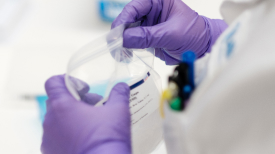- Cancer Care Team
Cancer Care Team
To deliver optimal patient outcomesProducts and Services
Cancer Type
Supplies & Tools
Scientific Focus
- Biopharma Partners
- Patients
- Education & Events
- Login
- Contact Us
Test Details
 Cancer Type
Cancer Type
Colorectal cancer (CRC)
 Technology Used
Technology Used
Molecular
 Turnaround Time
Turnaround Time
5 - 7 days
Use
KRAS is a guanosine triphosphate (GTP) binding protein involved in downstream receptor signaling, which is critical for cell proliferation, survival, and differentiation. Mutations in the KRAS oncogene are frequently found in human cancers. They are common in pancreatic, colorectal, lung, gallbladder, bile duct, and thyroid cancer. This assay will detect KRAS mutations in exons 2, 3, and 4, allowing the determination of drug response.
Special Instructions
Provide a copy of the pathology report; the KRAS test will be delayed if the pathology report is not received. Direct any questions regarding this test to customer service at 800-345-4363.
Limitations
This assay is able to detect 5% mutation in a background of wild-type DNA.
This test was developed, and its performance characteristics determined, by LabCorp. It has not been cleared or approved by the US Food and Drug Administration (FDA).
Methodology
SNaPshot Multiplex PCR (primer extension-based method)
Specimen Requirements
Information on collection, storage, and volume
Specimen
Formalin-fixed, paraffin-embedded (FFPE) tissue block or slides.
Volume
Formalin-fixed, paraffin-embedded tissue block or four unstained slides and one matching H&E-stained slide at 5 µM.
Minimum Volume
Two unstained slides and one matching H&E-stained slide at 5 μM. Samples with >4 mm² and ≥50% tumor content are preferred.
Container
FFPE tissue blocks or slides.
Storage Instructions
Maintain blocks and slides at room temperature.
Causes for Rejection
Tumor block containing no tumor tissue; broken or stained slides
Related Tests
Find more tests related to this one.





